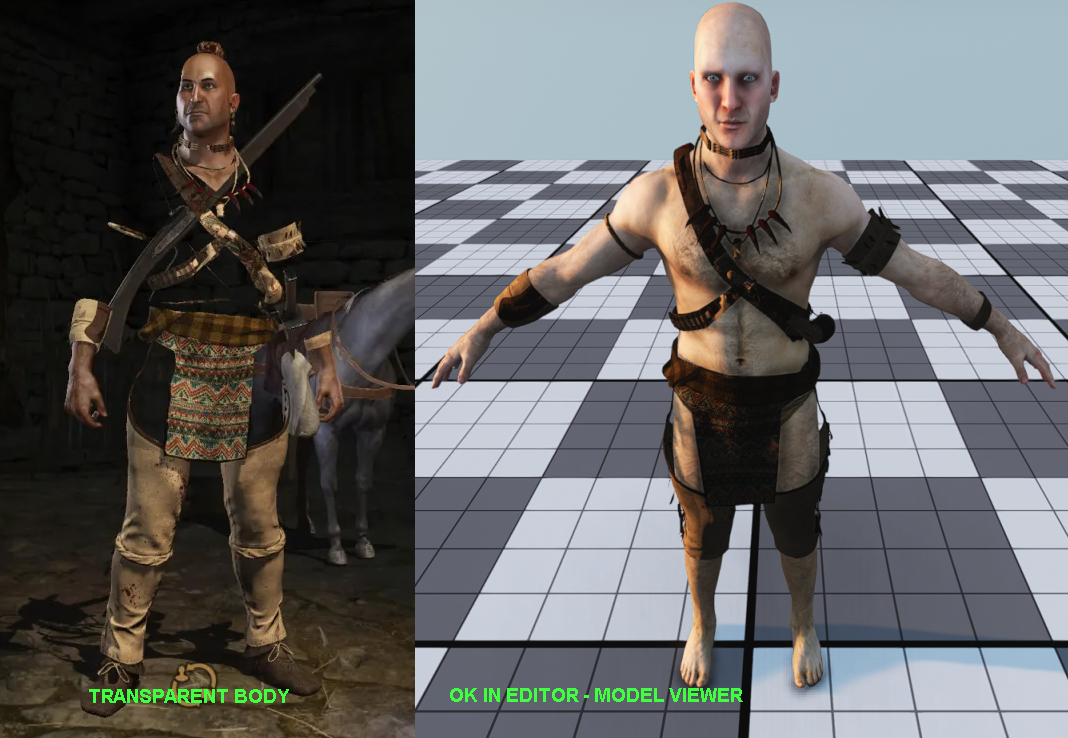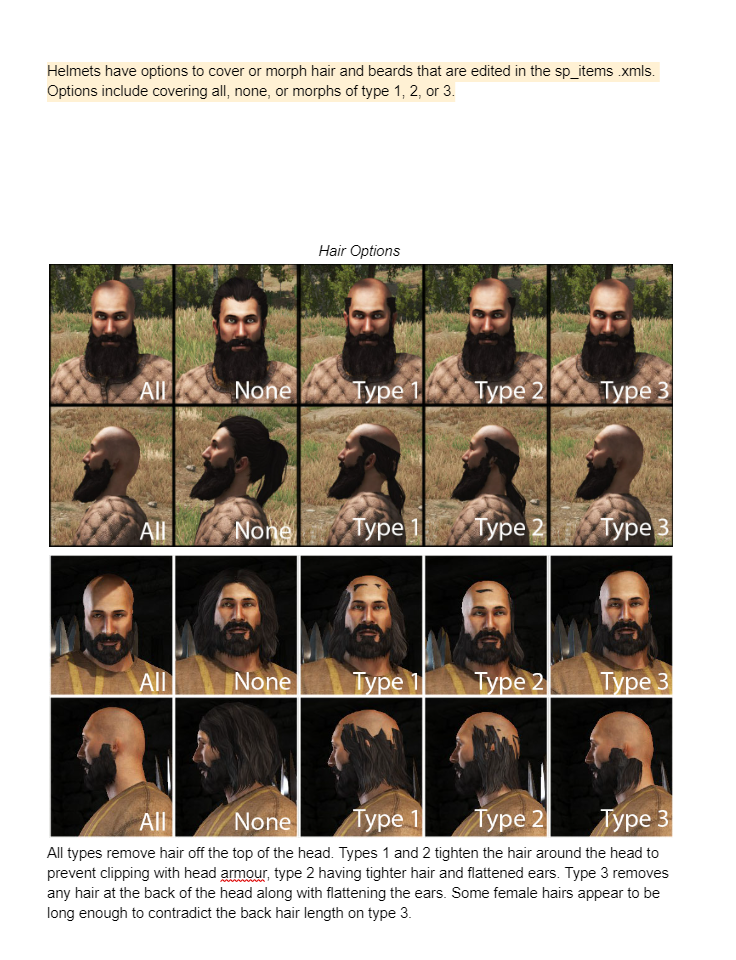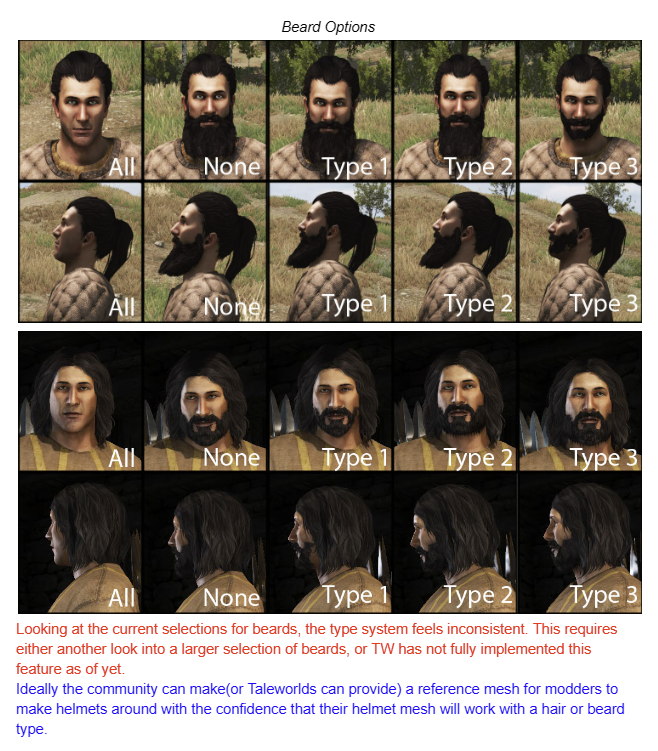Items
Tutorials
ItemObject
Trade Items:
beer
butter
cheese
date_fruit
fish
grape
grain
meat
olives
charcoal
ironIngot1 (Crude Iron)
ironIngot2 (Wrought Iron)
ironIngot3 (Iron)
ironIngot4 (Steel)
ironIngot5 (Fine Steel)
ironIngot6 (Thamaskene Steel)
clay
cotton (Raw Silk)
flax
fur
hardwood
hides
jewelry
leather
linen
oil
pottery
salt
silver
spice
tools
velvet
wine
wool
cat
dog
chicken
goose
hog
sheep
cow
stolen_goods
planks (1.3)
walrus_tusk (DLC)
whale_oil (DLC)
ItemRoster
Class to describe all items the Party/Town/Hero has.
Properties
int Count [get]
float TotalWeight [get]
int TotalFood [get]
int FoodVariety [get]
int TotalValue [get]
int TradeGoodsTotalValue [get]
int NumberOfPackAnimals [get]
int NumberOfLivestockAnimals [get]
int NumberOfMounts [get]
Examples
Count all food items in the ItemRoster
How many grain player party has:
PartyBase.MainParty.ItemRoster.GetItemNumber(MBObjectManager.Instance.GetObject<ItemObject>("grain"));
How many grain settlement has:
Check how much of item X the party has example method
public static int GetPartyItemCount(MobileParty party, string itemID)
{
if (party == null || party.ItemRoster == null) return 0;
if (itemID.Length == 0) return 0;
ItemObject item = MBObjectManager.Instance.GetObject<ItemObject>(itemID);
if (item == null) return 0;
return party.ItemRoster.GetItemNumber(item);
}
Check if party has X items example method
public static bool PartyHasItemCount(MobileParty party, string itemID, int count)
{
if (party == null || party.ItemRoster == null) return false;
if (itemID.Length == 0) return false;
if (count < 0) return false;
ItemObject item = MBObjectManager.Instance.GetObject<ItemObject>(itemID);
if (item == null) return false;
if (party.ItemRoster.GetItemNumber(item) >= count) return true;
return false;
}
Add Item to ItemRoster
ItemObject butterItemObject = MBObjectManager.Instance.GetObject<ItemObject>("butter");
if (butterItemObject != null) {
ItemRosterElement itemRoster = new ItemRosterElement(butterItemObject, 2, null);
MobileParty.MainParty.ItemRoster.Add(itemRoster);
}
Add X items to the party method example
public static void AddItemsToParty(MobileParty party, string itemID, int count)
{
if (party == null || party.ItemRoster == null) return;
if (itemID.Length == 0) return;
if (count < 0) return;
ItemObject item = MBObjectManager.Instance.GetObject<ItemObject>(itemID);
if (item == null) return;
party.ItemRoster.Add(new ItemRosterElement(item, count, null));
}
Remove
ItemRosterElement itemRosterElement = new ItemRosterElement(itemObject, 10, null);
settlement.Stash.Remove(itemRosterElement); // from settlement's stash
party.ItemRoster.Remove(itemRosterElement); // from party
Remove X items from the party example method
public static void RemoveItemsFromParty(MobileParty party, string itemID, int count)
{
if (party == null || party.ItemRoster == null) return;
if (itemID.Length == 0) return;
if (count < 0) return;
ItemObject item = MBObjectManager.Instance.GetObject<ItemObject>(itemID);
if (item == null) return;
party.ItemRoster.Remove(new ItemRosterElement(item, count, null));
}
Sell
Price
Returns weird price, not the same as in the Trade screen.
town.GetItemPrice or village.GetItemPrice:
int GetItemPrice(ItemObject item, MobileParty tradingParty = null, bool isSelling = false)
int GetItemPrice(EquipmentElement itemRosterElement, MobileParty tradingParty = null, bool isSelling = false)
This returns the same price as in the Trade screen.
town.MarketData.GetPrice or village.MarketData.GetPrice
int GetPrice(ItemObject item, MobileParty tradingParty, bool isSelling, PartyBase merchantParty)
int itemPrice = village.MarketData.GetPrice(item, MobileParty.MainParty, false, village.Settlement.Party);
item.value - returns default item's value (from XML?)
Tier
Public enum ItemTiers
{
Tier1,
Tier2,
Tier3,
Tier4,
Tier5,
Tier6,
NumTiers
}
Tier 0 (in GUI) == -1 when comparing with ItemTier.
For a head armor Tier is set automatically based on the <ItemComponent><Armor head_armor value
By price for other types of armors also:

InventoryManager
Screen(s) to trade/exchange items
InventoryManager.OpenScreenAsReceiveItems(itemRoster, new TextObject("Top Left Name"), new InventoryManager.DoneLogicExtrasDelegate(OnInventoryScreenDone));
More functions
public static void OpenScreenAsInventoryOfSubParty(MobileParty rightParty, MobileParty leftParty, DoneLogicExtrasDelegate doneLogicExtrasDelegate) // not used in-game, crash on exit
public static void OpenScreenAsInventoryForCraftedItemDecomposition(MobileParty party, CharacterObject character, DoneLogicExtrasDelegate doneLogicExtrasDelegate)
public static void OpenScreenAsInventory(DoneLogicExtrasDelegate doneLogicExtrasDelegate = null
public static void OpenScreenAsReceiveItems(ItemRoster items, TextObject leftRosterName, DoneLogicExtrasDelegate doneLogicDelegate = null)
public static void OpenScreenAsTrade(ItemRoster leftRoster, SettlementComponent settlementComponent, InventoryCategoryType merchantItemType = InventoryCategoryType.None, DoneLogicExtrasDelegate doneLogicExtrasDelegate = null)
public static void OpenScreenAsInventoryOf(MobileParty party, CharacterObject character)
public static void OpenScreenAsInventoryOf(PartyBase rightParty, PartyBase leftParty)
public static void OpenScreenAsLoot(Dictionary<PartyBase, ItemRoster> itemRostersToLoot)
public static void OpenScreenAsStash(ItemRoster stash)
public static void OpenTradeWithCaravanOrAlleyParty(MobileParty caravan, InventoryCategoryType merchantItemType = InventoryCategoryType.None)
Crash if used in mission
Type: System.AccessViolationException
Message: Attempted to read or write protected memory. This is often an indication that other memory is corrupt.
Stacktrace:
at void ManagedCallbacks.ScriptingInterfaceOfIMBMission.GetBoundaryPoints(UIntPtr missionPointer, string name, int boundaryPointOffset, Vec2[] boundaryPoints, int boundaryPointsSize, ref int retrievedPointCount)
at List
Get Items in-game
Trade goods: Items.AllTradeGoods
Other: Items.All.Where(item => (whatever condition you want))
Items.All.Where(item => item.Type == ItemObject.ItemTypeEnum.Goods && !item.StringId.Contains("book")))
// get ordered by Name
var orderedItems = Items.All
.Where(item => item.Type == ItemObject.ItemTypeEnum.Goods && !item.StringId.Contains("book"))
.OrderBy(item => item.Name.ToString(), StringComparer.Ordinal);
foreach (ItemObject item in orderedItems) { // do something with the items }
XML
Folder
\Modules\SandBoxCore\ModuleData\items
Basic trade goods described in this file:
\Modules\SandBoxCore\ModuleData\items\horses_and_others.xml
For mods:
\MODFolder\ModuleData
PROBLEM: Items are not loaded from XML
Check your engine logs for item read errors/warning. As I said before a new behavior that I experienced with 1.2++ versions of the game that if you have a faulty item, all the item definitions coming after it will not load either, not just the one that is bad. So maybe there has always been one that was bad, you just didnt notice it among the hundreds of items. (hunharibo)
Properties
- 'mesh' - 3D mesh
- 'using_tableau' - true if an item (usually body armor) has banner/sigil on it
- 'is_merchandise' - is used to determine whether an item is a merchandise or not. Used in the game code to determine if Item can be lost, on deciding rewards and something else
- 'appearance' - used in calculating the item value (CalculateValue): return (int)(num2 * num * (1f + 0.2f * (item.Appearance - 1f)) + 100f * MathF.Max(0f, item.Appearance - 1f));
- 'value' - price
- 'weight'
- 'culture' (optional) - Defined culture of the current item. If an item is set for a culture, the item will only be sold on the markets of the same culture. Can't have multiple values of the 'culture' attribute, so that the product is available for sale in towns of only two cultures. You can set it to neutral culture, but then it will show up everywhere.
- 'difficulty' - (need confirmation) is used to indicate the level of difficulty in crafting an item
- 'item_category' - (need confirmation) influences price range based on the market. Example - if item_category="jewelry" and item value="1000", in-game item can cost from ~1000 at start and drop to 150 after few weeks. Because jewelry prices drop in the region. If this item_category is changed to let's say 'book', then in-game same item costs ~1000 again.
- 'subtype' - is used to provide additional information about the type of item being defined. The subtype property is often used in conjunction with the item_category property to further refine the classification of an item
- 'covers_body' - true/false, property for an armor to tell if body should be hidden (true) or not (false)
ItemObject
Required skill/value:
ItemObject.RelevantSkill, ItemObject.Difficulty
Type
ItemTypeEnum
- Invalid
- Horse
- OneHandedWeapon
- TwoHandedWeapon
- Polearm
- Arrows
- Bolts
- Shield
- Bow
- Crossbow
- Thrown
- Goods
- HeadArmor
- BodyArmor
- LegArmor
- HandArmor
- Pistol
- Musket
- Bullets
- Animal
- Book
- ChestArmor
- Cape
- HorseHarness
- Banner
Type="Goods" sets ItemObject.IsTradeGood == true and ItemObject.ItemType == "Goods"
Caravan Ambush mission
Gives 3 random "Goods" type items as a reward. So if your item type is "Goods", they will be given at some point.
Q. How to make certain items not appear in the lootpool and also in the marketplace?
A. Set is_merchandise="false" and assign to the culture that does not have markets, e.g. Looters/Bandits (Culture.looter)
It appears that items that are not for sale (is_merchandise="false") may appear as prizes in tournaments. But it probably depends on the cost of the item - the higher it is, the greater the likelihood.
Broken Item
Since 1.2.x, if a single item is broken, everything past that won't get loaded
So lets say you have a list of 100 items. If item 32 is broken, everything after doesn't appear in game.
If you want to more easily find out which it is check your logs in programdata (its a hidden folder so you gotta make hidden folders visible) and search for null or invalid.

Transparent Body

Use covers_body="false" in items.xml for that item
How to find ItemID
Let's say we want to find ItemID for this item:

Easy way: use this mod
Hard way: Use ripgrep in the game's folder:
rg -C 5 "Thinhide Coif"
And you will see (among a lot of other stuff):
Modules\SandBoxCore\ModuleData\items\head_armors.xml
869- </Item>
870- <!-- #region Battania Armors -->
871- <!-- #region Battania Head Armors -->
872- <!-- #region Battania Light Head Armors -->
873- <Item id="thinhide_coif"
874: name="{=Q50hfNjW}Thinhide Coif"
875- subtype="head_armor"
876- mesh="battania_helmet_a"
877- culture="Culture.battania"
878- weight="0.5"
879- difficulty="0"
This is what you need:
Then you can use it in your mod. Example:
...and mesh
Mesh (3D model's name) usually is different from the ItemID, and you can find it in the item's definition in the XML:
You will need it for export from TpacTool and working with 3D program such as Blender.
Remove Native Items
Example here
Helmet Hair Coverage

Beard Coverage
